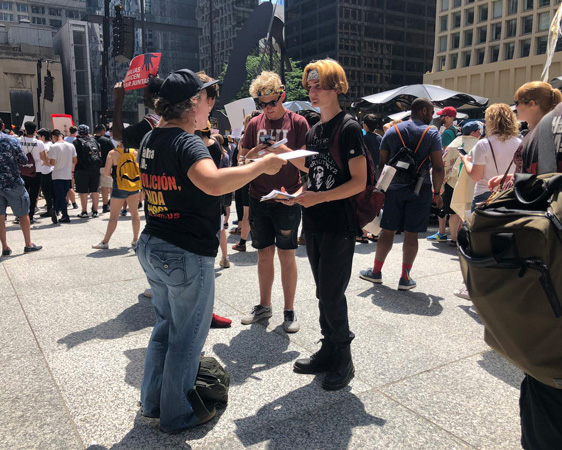Further Thoughts on Putting the Problems of the Revolution Before the Masses
| revcom.us
For people who actually care about the 5 STOPS but who are only encountering revolution for the first time and don’t yet know what they think about it, just saying “come help us solve the problems of the revolution” (which they are not sure they want to do yet) would be pretty meaningless. “Putting the problems of the revolution before the masses” means involving them in grappling with what is objectively holding back the revolutionary advance, including the small numbers, and not asking brand-new people if they know how to get to communism!
“Given all the terrible things going on (5 STOPS...)—everything the Trump/Pence regime is doing—WHY do you think there aren’t thousands, or even millions, of people in the streets?” “What do you think is going to change if people just wait for the Democrats to deal with all this? They’re not doing anything!” “When the system is the source of so many horrors (5 STOPS...) is it better to “work within the system or outside the system?” “Is it enough to simply spread the word and register our discontent through a few social media posts, or do we have to actually get out there in society more broadly, demand change and shake things up?” “Social media can help spread the word to many people, but don’t we have to do more than spread information and viewpoints? What can millions of people manifesting in the streets accomplish that activism limited to social media cannot, and how can we let millions of people know about THAT?” “The system of capitalism-imperialism gave us Trump/Pence and their whole fascist movement... do you really think this problem can be solved just by voting?” “If millions of people were in the street saying “no more!” to the horrors generated by this system (again, 5 STOPS...) what effect do you think that might have on the Democrats and infighting at the top of the ruling circles?” “Weren’t mass protest and other forms of civil unrest in the 1960s and 1970s key to ending the Vietnam war, driving out a president, and pressing demands for various civil rights?” “Why is there no antiwar movement on college campuses?” “What do you think about all this ‘thank you for your service’ shit?” Or: “Why are so many youth [in the inner cities] still caught up in joining the gangs and all that, and killing each other, instead of joining the revolution—and what will it take to get them moving with the revolution and becoming a key part of getting ready to bring down the whole system that has got them in this terrible situation and that causes so much hell for people here and all over the world?” So let’s continue this discussion: round up a few friends or just come yourself because we are going to keep talking about all this later today, or tonight, at (location and time).
I really think lots of people WANT to talk about these types of questions/obstacles. These are objectively obstacles to revolution, even if they don’t quite see it that way yet because they are new. But communists wrangling with brand-new people (who care) over such questions (and how to get that geometric progression going) IS, objectively, “putting the problems of the revolution before the people” and can also really help break down the “us/them divide.” Communists leading this type of active social investigation are in an excellent position to at one and the same time learn a lot we ourselves need to know more about in terms of what holds people back, and actively transform the thinking of people through this very process. Lively and largely informal get-togethers to really wrangle over such questions and problems of these times can attract, inspire, and organizationally retain. We need to do a lot more of this!
Of course, from the beginning and in an ongoing way, all of this needs to be put in the context of the revolution that is needed (and the very important things we do have going for us in relation to that) but, at the same time, we need to be straightforwardly putting to people what we do not yet have (including what we do not know—another way of saying that we need to be putting before masses of people, and involving them in the process of grappling with and coming up with the answers to, not only the tactical and organizational shortcomings and problems of the revolution, as important as those are, but above all the political and ideological problems of the revolution), and, in line with the “commitment principle,” this needs to be done in a way that enables people to actually grapple with and contribute to solving these problems, in accordance with what their level of understanding and commitment is at any given time.
This is an expression—in the political/ideological dimension—of what is said in Why We Need An Actual Revolution And How We Can Really Make Revolution: “People can start with basic tasks that they can readily carry out and feel confident doing which make a real contribution to building the revolution, and can learn to take on more responsibility as they gain more experience and a deeper understanding. The important thing is that they are part of the process of building the revolution, together with others.”
See also
Some Thoughts On The National Tour:
More On Putting the Problems and Needs of the Revolution Before the Masses
July 19, 2019

Get a free email subscription to revcom.us:

